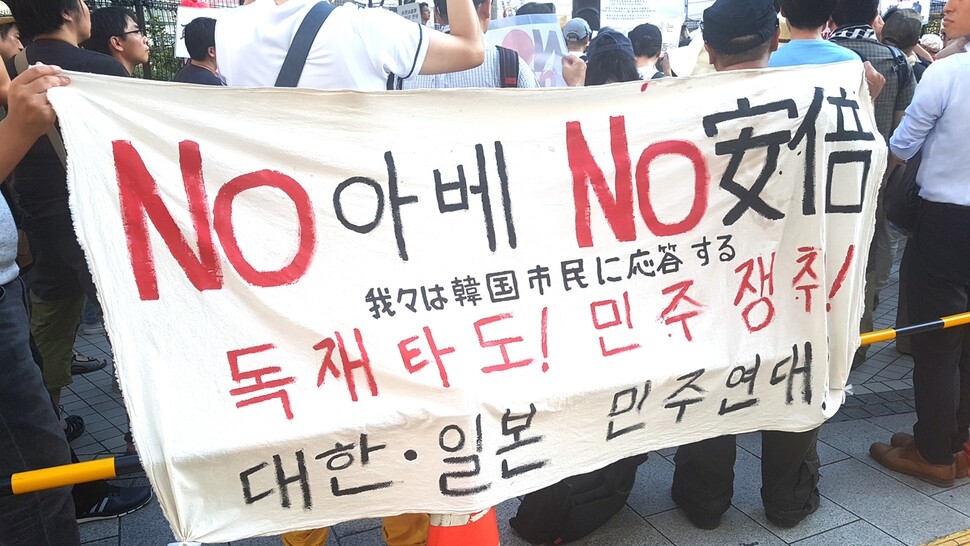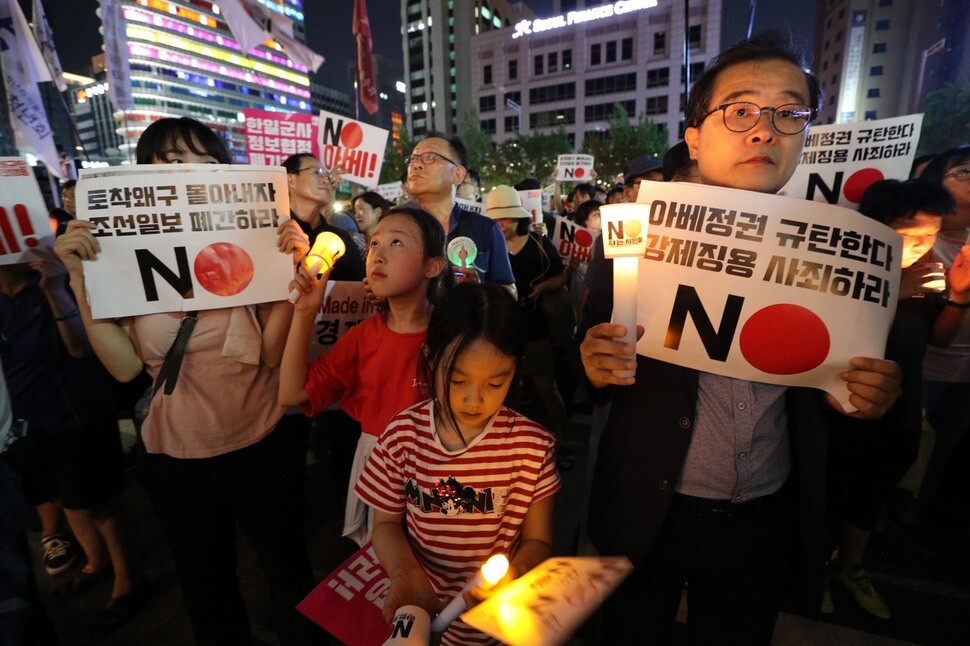hankyoreh
Links to other country sites 다른 나라 사이트 링크
S. Korean and Japanese civic groups unite in opposition to Abe

Civic groups in South Korea and Japan are joining forces in a united front against Japanese Prime Minister Shinzo Abe as Tokyo’s economic retaliation measures escalate into economic warfare between the two sides.
The South Korean civic group Joint Action for Resolution of the Forced Mobilization Issue and Settling Historical Matters plans to hold an “international peace parade” event on Korea’s National Liberation Day, Aug. 15, with a Japanese civic group bearing the same name. The Japanese Joint Action was formed by Japanese civic groups last November after a South Korean Supreme Court ruling ordered Japanese companies to pay compensation to forced labor victims.
On the morning of Aug. 11, the participants plan to march from Seoul Plaza to the Japanese Embassy and deliver a statement of protest to the ambassador.
The organization has an estimated 2,000 members, including survivors of forced labor and their family members as well as ordinary South Korean teenagers and university students, Zainichi Koreans, and members of Japanese civic groups.
The Japanese Joint Action also released a statement of solidarity at a “third candlelight festival to denounce Abe for his distortions of history, economic invasion, and threats to peace” held in front of the former Japanese embassy in Seoul’s Jongno district on Aug. 3. In the statement, the group said the Abe administration “seeks to act as though the South Korean Supreme Court ruling ‘never happened’ and once again ignore history by inciting antagonism between South Korea and Japanese citizens.”
“Rather than remaining at odds, South Korean and Japanese citizens need to join forces in demanding a restoration of the rights of forced labor victims and a resolution to the forced labor mobilization issue,” it said.

A member of Citizens’ Action to Denounce Abe, which organized the candlelight cultural festival, explained, “We proposed writing the statement, and the Japanese Joint Action group readily agreed.”
“The basic position of Citizens’ Action is not ‘anti-Japan’ – it is critical of the Abe administration,” the official stressed. Citizens’ Action also plans to hold a closed-door forum on Aug. 15 [National Liberation Day] to discuss how South Korean and Japanese civic groups can respond jointly to the recent situation in bilateral relations.
Organizing in support of atomic bomb victims
A gathering is also being organized for members of South Korean and Japanese civic groups to jointly remember victims of the atomic bombs. South Korean groups – including the South Korean committee of the Asia-Wide Campaign against the US-Japanese Domination and Aggression of Asia (AWC), the Won-Buddhist Economic Alliance, and 30km Solidarity to Prevent Nuclear Reprocessing Testing – planned to hold a joint South Korea-Japan press conference for the atomic bombing of Hiroshima with AWC’s Japanese liaison council at 10 am on Aug. 6 in front of the statue of Admiral Yi Sun-sin in Seoul’s Gwanghwamun Square. The date marks the 74th anniversary of the US dropping an atomic bomb on the Japanese city of Hiroshima.
“If [South Korea and Japan] clash at a country-to-country level, the only result will be nationalist conflict,” said Heo Yeong-gu, representative of AWC’s South Korean committee.
“It’s important that conscientious citizens in Japan who oppose the Abe administration receive support and solidarity from South Korea so that they can truly have an influence in Japan rather than being mobilized as part of a ‘country vs. country’ conflict,” Heo stressed.
S. Korean and Japanese religious communities show their support
Figures from the religious community have also lent their support. The National Council of Churches in Korea (KNCC) plans to hold a joint South Korea-Japan “prayer meeting for the current situation” at Seoul Gospel Church in Jongno at 2:30 pm on Aug. 11. Around a dozen ministers affiliated with the National Christian Council in Japan (NCCJ) are scheduled to take part in the meeting. During the event, South Korean and Japanese ministers plan to call on the Abe administration to offer a genuine apology on historical matters including forced labor and the comfort women, while speaking out against Japan’s economic retaliation measures and attempts to amend its Peace Constitution.
“We organized this prayer meeting to show that South Korea and Japanese churches are of one mind on the anti-peace, anti-historical currents recently taking place in Japan,” a KNCC official said.
Among the Japanese public, denunciations of the Abe administration have become increasingly vocal. In a statement issued on Aug. 1, the National Railway Chiba Motive Power Union – which includes workers from the Chiba branch of the Japanese railway company JR East – said the Abe administration was “vigorously attacking the South Korean Supreme Court decision ordering a Japanese company to pay compensation to conscripted labor [victims] and invoking retaliatory export controls to incite nationalism, jingoism, and hostility toward South Korean democracy.”
“We cannot forgive these immoral attacks,” the statement said.
On Aug. 4, around 200 Japanese citizens demonstrated in Tokyo’s Shinjuku neighborhood as a gesture of solidarity with the “No Abe” movement by South Koreans. After seeing the “No Abe” slogan in South Korea, Japanese citizen Yoshizuki Kinoto sympathized with the South Koreans’ aims and went on Twitter to announce his plans to hold a demonstration and express solidarity.
By Lee Yu-jin, Yi Ju-been, staff reporters, and Cho Ki-weon, Tokyo correspondent
Please direct comments or questions to [english@hani.co.kr]

Editorial・opinion
![[Column] Season 2 of special prosecutor probe may be coming to Korea soon [Column] Season 2 of special prosecutor probe may be coming to Korea soon](https://flexible.img.hani.co.kr/flexible/normal/500/300/imgdb/original/2024/0426/3317141030699447.jpg) [Column] Season 2 of special prosecutor probe may be coming to Korea soon
[Column] Season 2 of special prosecutor probe may be coming to Korea soon![[Column] Park Geun-hye déjà vu in Yoon Suk-yeol [Column] Park Geun-hye déjà vu in Yoon Suk-yeol](https://flexible.img.hani.co.kr/flexible/normal/500/300/imgdb/original/2024/0424/651713945113788.jpg) [Column] Park Geun-hye déjà vu in Yoon Suk-yeol
[Column] Park Geun-hye déjà vu in Yoon Suk-yeol- [Editorial] New weight of N. Korea’s nuclear threats makes dialogue all the more urgent
- [Guest essay] The real reason Korea’s new right wants to dub Rhee a founding father
- [Column] ‘Choson’: Is it time we start referring to N. Korea in its own terms?
- [Editorial] Japan’s rewriting of history with Korea has gone too far
- [Column] The president’s questionable capacity for dialogue
- [Column] Are chaebol firms just pizza pies for families to divvy up as they please?
- [Column] Has Korea, too, crossed the Rubicon on China?
- [Correspondent’s column] In Japan’s alliance with US, echoes of its past alliances with UK
Most viewed articles
- 1‘We must say no’: Seoul defense chief on Korean, USFK involvement in hypothetical Taiwan crisis
- 2N. Korean delegation’s trip to Iran shows how Pyongyang is leveraging ties with Moscow
- 3[Column] Season 2 of special prosecutor probe may be coming to Korea soon
- 4‘Weddingflation’ breaks the bank for Korean couples-to-be
- 5[Column] Has Korea, too, crossed the Rubicon on China?
- 6[Editorial] New weight of N. Korea’s nuclear threats makes dialogue all the more urgent
- 7[Reportage] On US campuses, student risk arrest as they call for divestment from Israel
- 8Korea sees more deaths than births for 52nd consecutive month in February
- 9[Column] Park Geun-hye déjà vu in Yoon Suk-yeol
- 10[Guest essay] The real reason Korea’s new right wants to dub Rhee a founding father